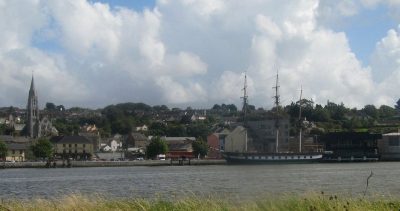Oliver Cromwell (25 April 1599 3 September 1658) was a member of the landed gentry from Cambridgeshire who is widely regarded as one of the most important statesmen in English history. He came to prominence during the 1639 to 1651 Wars of the Three Kingdoms, first as a senior commander in the Parliamentarian army and then as a politician. A leading advocate of the Execution of Charles I in January 1649, which led to the establishment of the Republican Commonwealth of England, Scotland and Ireland, he ruled as Lord Protector from December 1653 until his death in September 1658. He was selected 10th in a 2002 BBC poll of the 100 Greatest Britons, but his use of the military to acquire political power and the brutality of his 1649 Irish campaign means he remains a deeply controversial figure in both Britain and Ireland to this day.Although Cromwell was elected MP for Huntingdon in 1628, the first 40 years of his life were largely undistinguished and at one point he contemplated emigration to New England. He became a religious Independent in the 1630s and thereafter believed his successes were the result of Divine providence. While he generally supported tolerance for the various Protestant sects of the time, he later opposed those he considered heretical, such as Quakers and Fifth Monarchists. In 1640, Cromwell was returned as MP for Cambridge in the Short and Long Parliaments, and joined the Parliamentarian army when the First English Civil War began in August 1642. He quickly demonstrated his military abilities and in 1645 was appointed commander of the New Model Army cavalry under Sir Thomas Fairfax, playing a key role in defeating the Royalists in the First and Second English Civil Wars.
Following the death of Charles I and exile of his son, military victories in Ireland and against the Scots from 1649 to 1651 firmly established the Commonwealth and Cromwell's dominance of the new republican regime. In December 1653, he was named Lord Protector of the Commonwealth, a position he retained until his death in September 1658, when he was succeeded by his son Richard, whose weakness led to a power vacuum. This culminated in the 1660 Stuart Restoration, when Charles II returned to the throne, after which Cromwell's body was removed from its resting place in Westminster Abbey and displayed at Tyburn. His head was placed on a spike outside the Tower of London, where it remained for 30 years until reburied at Sidney Sussex College, Cambridge.
Cromwell has been variously described as a military dictator by Winston Churchill, and a hero of liberty by John Milton, Thomas Carlyle, and Samuel Rawson Gardiner, while the debate over his historical reputation continues. First proposed in 1856, his statue outside the Houses of Parliament was not erected until 1895, most of the funds being privately supplied by Lord Rosebery, then Prime Minister. In 2004, a group of MPs unsuccessfully proposed a motion to have it melted down.
New Ross (Irish: Ros Mhic Thriúin, formerly Ros Mhic Treoin) is a town in southwest County Wexford, Ireland. It is located on the River Barrow, near the border with County Kilkenny, and is around 20 kilometres (12 mi) northeast of Waterford. In 2016 it had a population of 8,040 people, making it the fourth-largest town in the county.

1649Oct, 19
New Ross town, County Wexford, Ireland, surrenders to Oliver Cromwell.
Choose Another Date
Events on 1649
- 11Mar
Peace of Rueil
The Frondeurs and the French sign the Peace of Rueil. - 19Mar
History of reform of the House of Lords
The House of Commons of England passes an act abolishing the House of Lords, declaring it "useless and dangerous to the people of England". - 19May
Long Parliament
An Act of Parliament declaring England a Commonwealth is passed by the Long Parliament. England would be a republic for the next eleven years. - 2Sep
Wars of Castro
The Italian city of Castro is completely destroyed by the forces of Pope Innocent X, ending the Wars of Castro. - 19Oct
Oliver Cromwell
New Ross town, County Wexford, Ireland, surrenders to Oliver Cromwell.

 English
English  español
español  français
français  português
português  русский
русский  العربية
العربية  简体中文
简体中文 